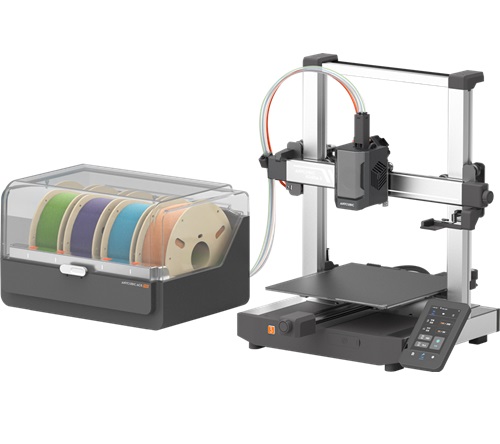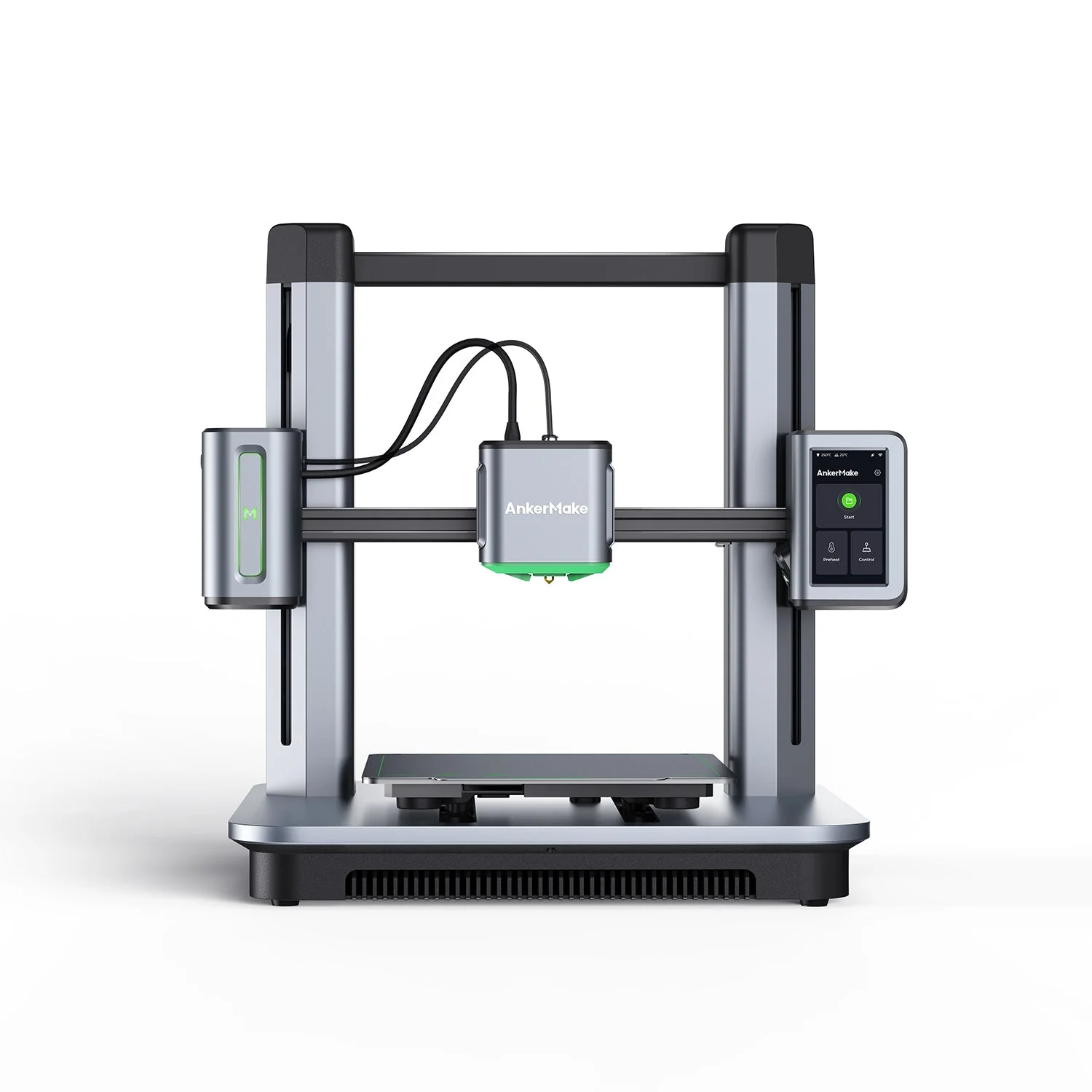Compare Kobra 3 Combo vs M5
Comparison between the best 3D printers
Choose the best 3D printer at the best price. The cheapest 3D printers are here.
Buy a 3D printer here with 3D Fila.
 |
 |
|
| Model | Kobra 3 Combo[BUY Kobra 3 Combo] |
M5 |
| Printing Material | Filament | Filament |
| Buy Filament for Anycubic Kobra 3 Combo | Buy Filament forAnkerMake M5 | |
| Estimated price | $349,00 | $497,00 |
| Manufacturer | Anycubic | AnkerMake |
| Release Year | 2024 | 2023 |
| Print Volume [mm] | 250x250x260 | 235x235x250 |
| Printer Size [mm] | 452x504x483 | 502x438x470 |
| Weight [kg] | 9,2 | 12,6 |
| Power Loss Recovery | YES | YES |
| Enclosed printer | NO | NO |
| Bed Leveling | Automatic | Automatic |
| Filament End Sensor | YES | YES |
| Bed type | Heated | Heated |
| Power supply system | Direct Drive | Direct Drive |
| Standard nozzle | 0,4 | 0,4 |
| Maximum Nozzle Temperature [°C] | 300 | 260 |
| Maximum Bed Temperature [°C] | 110 | 100 |
| Maximum printing speed [mm/s] | 600 | 500 |
| Filament holder | YES | YES |
| Camera for supervision | NO | NO |
| Recommended filaments | PLA, PETG, ABS, PP, HIPS | PLA, PETG, ABS |
| Recommended slicers | Anycubic Slicer, Cura, Orca Slicer | AnkerMake Studio (macOS, Windows), Simplify3D, Ultimaker Cura, PrusaSlicer |
| Maximum Resolution [mm] | 0,1 | 0,1 |
| Processor | 32 bits | |
| Display | Touchscreen 4,3'' | Touchscreen 4,3'' |
| Power Supply | 400 W | 350 W |
| Connectivity | USB, Wi-Fi, Cloud | Wi-Fi, USB-C, OTA Upgrade |
| Operating systems | Windows, Linux, Macbook | Windows, Linux, Macbook |
| Date of registration in the system | 2024-06-27 | 2024-07-08 |
| Release date | 2024 | 2023 |
| Extra features | The Anycubic Kobra 3 Combo offers advanced features, including multi-filament printing with the ACE (Anycubic Color Engine) system, allowing for quick switching of up to four filaments. It features automatic bed leveling, nozzle clogging detection, and integrated filament drying during printing. The printer supports technical materials such as ABS, ASA, Nylon, and PC, thanks to the hotend that reaches 300°C and the heated bed up to 110°C. In addition, it has a 4.3-inch touchscreen and compatibility with various slicers such as Anycubic Slicer, Cura, and Orca Slicer. | The AnkerMake M5 printer stands out for its impressive print speed, reaching up to 500mm/s. It features AI print monitoring, an integrated camera for creating timelapses, auto-leveling bed with pressure sensor, direct extruder, flexible PEI-coated build plate, and Wi-Fi and USB-C connectivity. Assembly is quick and easy, and the printer is designed to deliver high print quality and ease of use. |
| Support for multiple colors and materials (AMS and CFS) | YES | NO |
Notes * |
||
| Cost-benefit | 8 / 10 | 7 / 10 |
| Hardware | 4 / 10 | 3.5 / 10 |
| Tela | . | . |
| Print volume | 4 / 10 | 3 / 10 |
| Performance | 5 / 10 | 4 / 10 |
| [BUY Kobra 3 Combo] |
Conclusion |
| In comparing the Anycubic Kobra 3 Combo and the AnkerMake M5, both printers offer compelling features but cater to different user needs and preferences. The Kobra 3 Combo shines with its advanced capabilities such as multi-filament printing, a high maximum nozzle temperature, and compatibility with a wider range of filaments. Its throughput in technical materials makes it a versatile choice for users looking to experiment with diverse printing applications. Additionally, the Kobra 3 Combo is slightly more affordable and offers superior print volume, making it attractive for those who prioritize extensive print capacity and material versatility. On the other hand, the AnkerMake M5 excels in speed and user-friendly features. Its high maximum printing speed and quick assembly make it suitable for those needing efficient production without sacrificing print quality. The inclusion of AI monitoring and features like timelapse functionality enhances the overall user experience for those interested in both functionality and aesthetic output. In conclusion, the choice between the Anycubic Kobra 3 Combo and the AnkerMake M5 ultimately depends on the user's specific requirements. If versatility, material compatibility, and print volume are top priorities, the Kobra 3 Combo emerges as the stronger candidate. Conversely, if speed and ease of use are the main considerations, the AnkerMake M5 would be the better option. Both printers provide excellent cost-benefit ratios and are excellent additions to any maker's toolkit, but they cater to different printing preferences and applications. |

